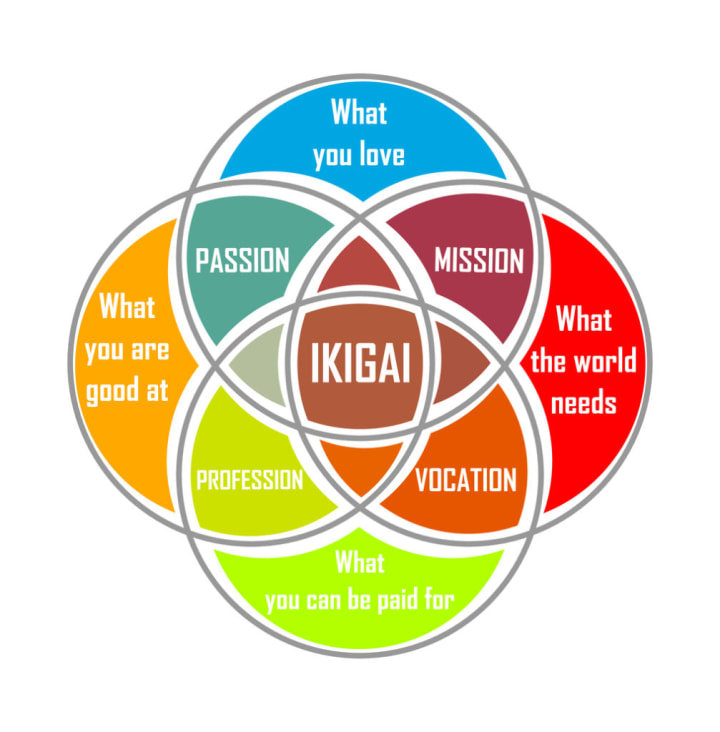A Brief View on Ikigai
Should You do What You Are Good at? Or What You Are Passionate About?

Are you wondering "what should I do with my life?". Have you been searching the whole of the internet for answers, and found yourself in front of a new word, Ikigai? No, Ikigai is not the name of a person trying to make you get rid of all of your stuff. Is more a...philosophy. A thinking framework.
Ikigai and its proponents seem to have all the answers you need when wondering about the future and careers. But should you follow the advice?
So today, here, we'll see a bit of Ikigai's origins, what it talks about, and if you should follow its teaching as a student looking to find your path, a business person trying to figure out a niche, or anyone else really.
Origins and concept of Ikigai
The term ikigai may be traced back to the Heian era (794 to 1185). Akihiro Hasegawa, a clinical psychologist and ikigai evolution expert, published a study article in 2001 in which he stated that the term "gai" derives from the word "kai," which translates to "shell" in Japanese.
Shells were exceedingly precious during the Heian period, therefore the connection of worth is still present in this term. It may also be observed in comparable Japanese phrases such as hatarakigai, which implies the worth of labour, or yarigai ga aru, which means "it's worth accomplishing."

Ikigai is a concept or a lifestyle strategy that helps us to find a balance between our goals and our pragmatism.
They taught us about groupings and the connections between them in elementary school. An Ikigai diagram is just that.
In the middle of various groups, there is a magnificent balance.
This balance is reached when your interests and talents intersect with what the world demands and is willing to pay for.
My View on Ikigai
My life interests are so various and different. My first lvoe has always been writing. Particularly fiction as a kid, poetry and cultural criticism nowadays.
But, you know, I'm not the best writer out there. I'm not saying I'm not someone to be read. Read me, please. We'll both benefit from it. But I know that there is still a long way to go to get better.
Am I going to make a living writing? Hopefully! But maybe not. Does it mean is not something I should be taking seriously?
I don't think so. I don't think that because only passion is there, it means I shouldn't pursue it.
Ikigai has one big limitation in my opinion (and at the best of my knowledge): it does not take into consideration growth, and getting better at things. Going from "no one would pay for this" to "people want me to do this".

Now sure, Ikigai is completely accurate for some things. Meaning, we need to put food on the table. So, while pursuing more dreamy passions, we might have to find the compromise Ikigai talks about.
For example, I have been studying for a long time Psychology. And with time I grew frustrated with it. I didn't find a fit. Sure, I was good at it, and people were going to pay for my skill and knowledge but...it wasn't something that would ignite any fire in me.
Still, I needed to compromise. So, during my time exploring opportunities I noticed that I had a lot of interest in marketing, behavioural economics, and consumer behaviours. Also, I grew an interest in design, and reading news about technologies and start-ups. So, I found my ikigai compromise.
I started a master in Applied Psychology, studying human behaviour, advertisement, consulting and all of the fields were psychology could be applied. Even health promotion, just not therapy.
Still. If I was one day to become the best writer I could be, I'd leave everything.
I'm just saying this because philosophies such as Ikigai can forget the human behind things. Meaning, our chances of growth, and our capacity for constant improvement.
When we try, of course.
In summary
If you do what you love but the world doesn’t need it or you’re not very good at it, according to Ikigai, you’ve got yourself a hobby at best.
If you are really excellent at something but do not enjoy it, it may be a career you will despise.
If you’re skilled at something but can’t be paid for it, it’s a hobby as well (Hobbies are cool BTW).
If the world requires something you enjoy doing but you cannot get compensated for it, it is a mission.
But does this mean you cannot pursue relentlessly those things that Ikigai calls hobbies, or missions?

No way, no how!!
You need growth mindset and grit,
Success is not an accident, success is a choice. — Stephen Curry
I think Ikigai is an awesome way to systematically analyse where your passions are at, and in a way that is definitely more practical than many other approaches.
But I also believe that we can learn to be good at virtually everything if we set our minds to it. It’s all about working hard and, more importantly, working intelligently. Having a strategy and showing up. As for me, I’ll keep writing!






Comments
There are no comments for this story
Be the first to respond and start the conversation.